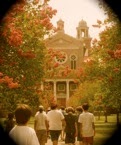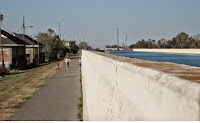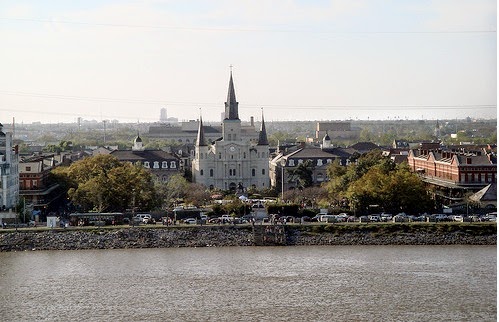 |
| Virginia Woolf, Photograph: AP |
But, what is the intellectual sphere and what does this have to do with Woolf studies?
The intellectual sphere is the realm of influence surrounding the propagation of ideas, forming an intellectual history from Confucius to Kant, et cetera. Intellectual history is the record of this journey; mainly domineered by men, so it is curious to consider Woolf as a member of this sphere.
Will Durant, the well-noted historian, listed the top-ten most influential thinkers and did not include a woman. It is difficult to think of the most influential thinkers in history without thinking of class and gender. And besides, do we think of Woolf as an intellectual, anyway? Novelist comes to mind. Essayist. Woolf did write 500 essays on topics ranging from current British figures, novelists and literary criticism. In A Room of One's Own she contributed to the idea of the androgynous mind, the idea that the most creative artist creates from the locus of both "man" and "woman".
Also, Woolf was a member of the Bloomsbury group: artists, writers, poets who didn't include the masses. She was a member of a higher social class than most; she didn't have to work. She was very well-educated -- more than many men -- but she didn't have a university education like her brothers. She was able to be educated because she was the daughter of an educated man; she read the books in his library. She describes herself as being between the devil and the deep sea (Three Guineas 74 See more on this page). Her father's library educated her: the Victorian books that surrounded her educated her; She received a pastiche education, pulling knowledge from wherever she could. She did feel bitterness about this; she writes in the Three Guineas about "University Education": "What is this mysterious process that takes about three years to accomplish, costs a round sum in hard cash, and turns the crude and raw human being into the finished product -- an educated man or woman?" (24).
But, are we speaking about an intellectual elitism here? Would Woolf consider herself a part of an elitist intelligentsia separated from the masses? How did Woolf imagine herself in the context of the intellectual elite and/or the public sphere? It is difficult to speak about "the intellectual" without also speaking about a class society. Intellectuals, as Gramsci puts it, come from the different social classes so as to articulate the identity of that particular class. This is different from Plato's idea of the Philosopher King in his dialogue The Republic. Ancient Greece was a democracy of free men, women excluded. The intellectual was a man who had the leisure time to spend writing and thinking. He was taught gymnastics in school, learned the art of war. The slaves worked or went to war -- the women stayed home and kept their chitons tight around their belts.
Plato does ask the question, though, why is it that Women are reserved the role of nurturer, thus the weaker sex, and man has the role of a warmonger, the stronger sex? Marx can be called a public intellectual for he wrote about the rise of the working class. Rosa Parks and Martin Luther King, Jr. were intellectuals for the Civil Rights Movement in the '60s. Cuddy-Keane, in her work on Woolf and the intellectual/Public sphere, argues against the popular notion that Woolf was an elitist. Woolf deliberately published her essays in magazines that many people read: Ladies' Home Journal, for example. Woolf gave lectures at schools on the importance of education. Again, in the Three Guineas, she writes about the importance of education, "judging for yourself, comparing the views" so as to distinguish between fact and fiction. Woolf didn't trust the status quo. She realized that the war effort wanted able bodies, producers, and women were fixed to provide for the state as long as they were forbidden from an education; the women's college that asks her for a guinea, she argues, will only purchase matches and petrol that will burn the college to the ground! (36). She noticed that the world is divided into public and private spheres.
In a comical way, she broke into this private sphere. As a young woman, she poked fun at government security by dressing up as an Ethiopian prince and boarding the HMS Dreadnought to the chagrin of the British Navy who fell for the hoax! Woolf realized that women were excluded from the private sphere and she wanted to bring the divide that separated them closer. Woolf published two book series called the Common Reader. In it, she published essays, literary criticism and biographical sketches for anyone to read. In a way, this is her most accessible work for the public intellectual sphere. The Three Guineas, which we read in class, is her most polemical attack; but also, her most insistence insertion into the intellectual sphere, championing her cause as a pacifist.
Works Cited:
Cuddy-Keane, Melba. Virginia Woolf, the Intellectual, and the Public Sphere. Cambridge. 2003
Woolf, Virginia. The Common Reader: First Series. Harcourt Brace. 1925, 1953.
--------------------. The Second Common Reader. Harcourt Brace. 1932.
---------------------, Three Guineas. Harcourt Brace. 1938, 1966.
I also consulted the Philosopher's Index, the Routledge Encyclopedia of Philosophy, the Dictionary of Intellectual History to find entries on Woolf. Woolf had one entry in the 2004 edition of the Philosopher's Index and none in the others, except a cross-reference note at the end of an article in the Philosophical Encyclopedia.
I also have a fuller, annotated bibliography on Virginia Woolf and the Intellectual Sphere posted here.








